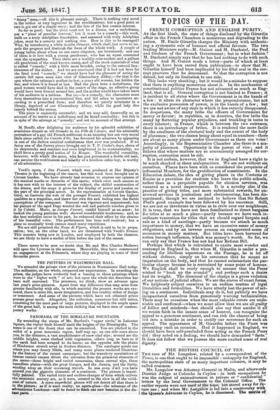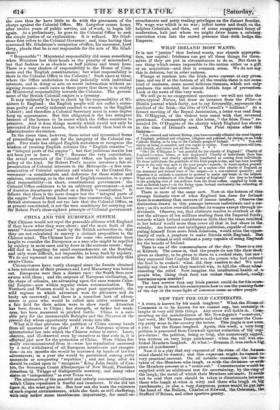THE BRITISI - I COUNCIL OF TEN.
THE case of Mr. Langalow, related by a correspondent of the Times, is one that ought to be impossible : unhappily for England, the metropolitan state of so many important colonies, it may be called common.
Mr. Langalow was Attorney-General in Malta, and afterwards District Judge at Colombo in Ceylon : in both occupations be was the subject of animadversion in private or " confidential " letters by the local Government to the Colonial Office. The earlier reports were not used at the time, but stored away for fu- ture use ; and when Mr. Langslow is led into a controversy with the Queen's Advocate in Ceylon, he is dismissed. The merits of
the case thus far have little to db with the gravamen of the charge against the Colonial Office. Mr. Lang,slow comes home, after twelve years of public service, out of work, to begin life
• again. As a preliminary, he goes to the Colonial Office to seek the simple justice of an explanation. It is refused. Mr. Glad- stone first refers to the Colonial Governor; _and, time having thus consumed Mr. Gladstone's occupation of office, his successor, Lord Grey, pleads that he is not responsible for the acts of Mr. Glad- stonel
" Responsible"! Ministerial responsibility did mean something when Ministers lost their heads as the penalty of misconduct ; but that fashion is as obsolete as buff jerkins and trunk hose. There is a very shadow of responsibility to the House of Com- mons and the English constituencies; but what responsibility is there in the Colonial Office to the Colonies ? Such cases as these, where the Office undertakes to deal judicially with individual interests, and in doing so acts on secret information without as- signing reasons—such cases as these prove that there is in reality no Ministerial responsibility towards the Colonies. The govern- ment of the British Colonial empire is a tyranny. It may indirectly be kept in check by the responsibility of Mi- nisters to England : the English people will not suffer a states- man guilty of overtly indecent conduct to remain in the English Cabinet ; and therefore a Colonial Secretary must in some degree keep up appearances. But this obligation is the less stringent because of the licence to be secret which the Office contrives to preserve. And it does things secretly which would not only be prevented if they were known, but which would then lead to an administrative revolution.
In the mean time, however, these secret and tyrannical forme of proceeding are not safe for the integrity of the Colonial em- pire. Free trade has obliged English statesmen to recognize the. Wisdom of treating English colonies like " English counties"— as "integral parts of the empire"; but that judicious maxim has not been put in force. Why ? Because the very constitution, the actual materials of the Colonial Office, are hostile to any policy of the kind. Sir Robert Peel's maxim involves a fair re- presentation of Colonial interests in the Metropolis—a free com- munication of Colonial opinions and wishes to the Central Go- vernmente consideration and deference for those wishes and, opinions, amounting, as in the case of English counties, to a prac- tical responsibility—in short, constitutional government : the Colonial Office continues to be an arbitrary government—a sort of Austrian department grafted on a British constitution." It follows that there is the more danger lest the "integral parts of the empire " should break loose some fine summer-day, and leave British statesmen to find out too late that the Colonial Office, as, at present constituted, is not the true machinery for carrying out Sir Robert Peel's clear-sighted principle of Colonial government.



























 Previous page
Previous page